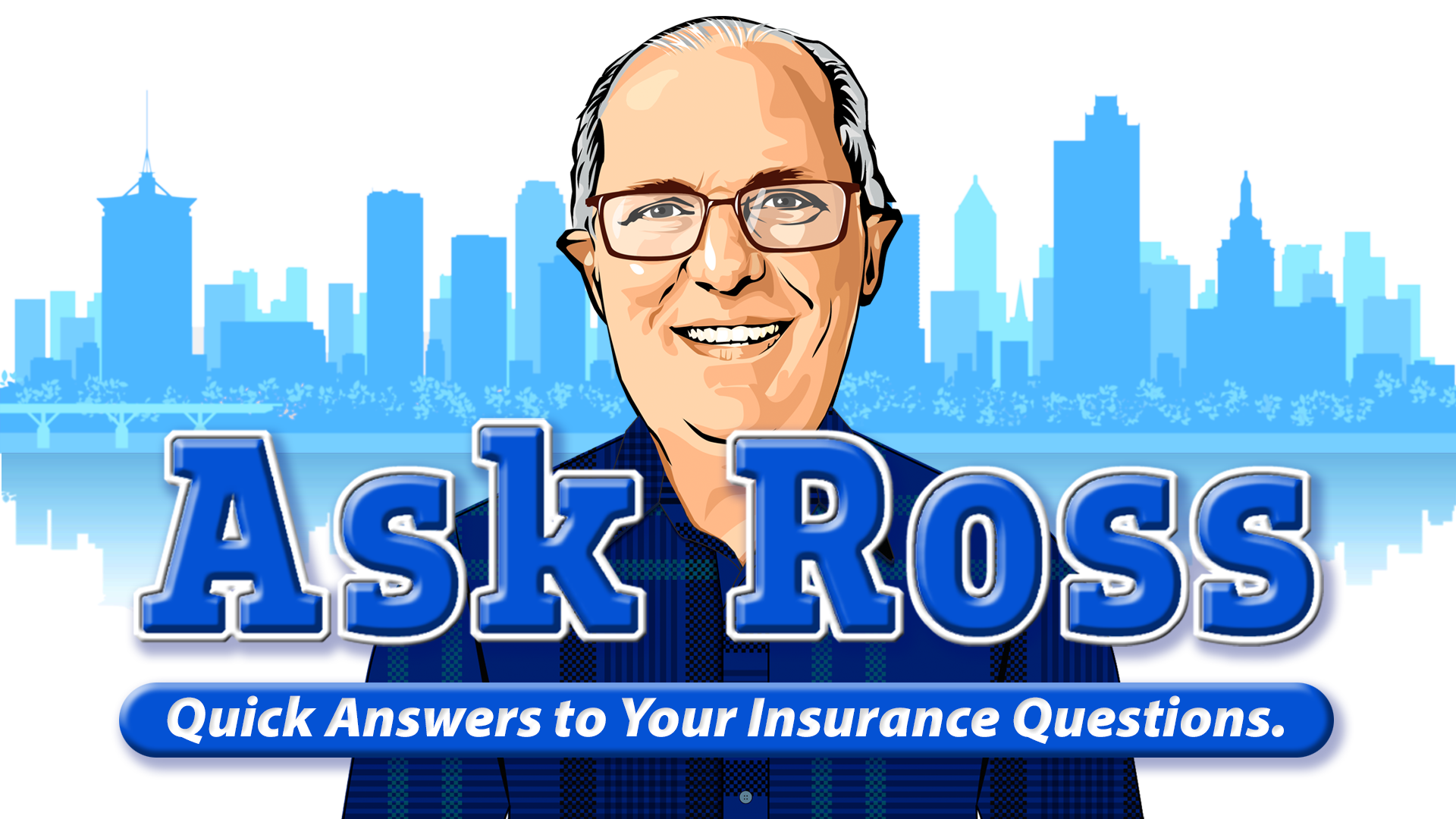Insurance Questions? Ask Ross.
Quick Answers to Common Insurance Questions

HOMEOWNERS INSURANCE FAQ
How are homeowners insurance premiums determined?
There are a number of factors are that are considered in determining your home insurance rate, including:
- Structure & Characteristics of Your Home: The year built, age of the roof, type of structure(s), and electrical wiring can all affect your homeowners insurance premium.
- Location: Local weather, local crime rates, and proximity to a fire hydrant can all factor into the cost of your home insurance.
- Safety & Security Technology: The presence of alarm systems, smoke detectors, fire extinguishers, and sprinkler systems keep your home safe and can lower your rate.
- History of Claims: Your home insurance rates will likely be higher if you have previous home insurance claims.
- Personal Factors: Your rates will be affected by factors such as your credit history and whether or not you’re a smoker.
What does homeowners insurance cover?
Most standard home insurance policies cover the following:
- Dwelling: Dwelling coverage helps pay to repair your home’s structure and attached structures such as a carport or garage. It may also cover damaged fixtures such as electrical wiring, heating systems, and plumbing.
- Other Structures: Following a covered loss, “other structures” coverage can help pay to repair detached constructions such as a fence, guesthouse, or tool shed.
- Loss of Use: If you’re displaced from your home due to covered damages, loss-of-use coverage can help pay expenses such as hotel bills and restaurant meals.
- Personal Property: Personal property coverage pays for your home’s contents, such as appliances, clothing, electronics, and furniture. It may also cover a child’s belongings when they go off to college for items stored off-site in a storage locker.
- Medical Payments: If a visitor sustains an injury in your home, medical payments coverage can help pay the medical costs.
- Personal Liability: This coverage can help pay legal bills if someone sues you for damages or injuries related to your home.
What’s excluded from homeowners insurance coverage?
Standard homowners insurance policies typically do not cover damage to your home, or its contents, caused by earthquakes or floods. These exclusions also extend to damages caused by landslides or mudslides, sewer or drain backups, or surface water.
How much homeowners insurance do I need?
Typically, you should carry enough dwelling coverage to rebuild your house. Rebuilding costs are generally lower than the home’s market value, which also includes the lot, something home insurance does not cover. Labor and material costs fluctuate over time, so it’s important to raise your policy’s coverage limits when these prices increase.
Insurers base other structures and personal property limits on a percentage of your dwelling coverage. If you own expensive outbuildings such as a barn or pool house, or have expensive personal property (jewelery, collectibles, etc.), you may need additional coverage.
What is the difference between Actual Cash Value and Replacement Cost Value
The property coverages of your policy may pay only Actual Cash Value to rebuild your home or replace its contents. With dwelling coverage, Actual Cash Value would pay the cost of repairing your home, minus its depreciated value due to age or use. When applied to personal belongings, Actual Cash Value policies pay the depreciated value of your property. For example, if a TV purchased for $1,000 two years ago were stole from your home, the insurance company would pay a depreciated amount based on the age of your TV. Some insurers offer replacement cost coverage for homes and their contents. When paying to rebuild a home, replacement cost coverage typically first pays actual cash value, then reimburses you for costs that exceed your policy’s dwelling limit. Personal property replacement cost coverage pays to replace a damaged or stolen item at its current market price.
What does homeowners liability insurance cover?
Property liability insurance generally covers injuries that occur on your property that are your responsibility. Property liability coverage may also cover damage to other people's property that is your responsibility.
How much homeowners liability insurance do I need?
You need sufficient personal liability coverage to protect all your assets. If, for example, you have $500,000 in assets, you need at least $500,000 in personal liability coverage. A standard homeowners policy may include personal liability coverage of around $100,000 per occurrence, but you may be able to increase the limit. If you need more liability coverage, consider buying an umbrella policy.
What is a homeowners liability umbrella policy?
An umbrella pays after you’ve exhausted the personal liability limit of your home insurance policy. Umbrella policies are generally relatively affordable, and often start at $1 million of coverage.
Does homeowners insurance have a deductible?
Most home insurance policies require you to pay a deductible, and deductible levels may vary by type of coverage. The lower your deductibles, the higher your premium, and vice versa. Deductibles usually range from $500 to $1,000, but some insurers enable you to choose lower or higher limits. Some policies include a separate hail and wind loss deductible. For instance, your dwelling coverage might feature a $1,000 deductible for most perils, but a $2,000 deductible for hail and wind damage.
Can my insurer cancel my coverage during the policy term?
In some circumstances, yes. Insurance companies can cancel your coverage before the end of the policy term under some cases, including:
- Nonpayment of the premium
- Abandonment of the property
- Fraud or misrepresentation when applying for insurance or filing a claim
- Physical changes to a home that render it uninsurable
- Reckless or willful acts that increase the insurer’s risk
- Criminal activity that can increase the carrier’s risk
Am I legally required to carry homeowners insurance?
Oklahoma law does not require homeowners to carry home insurance. However, if you have a mortgage, your lender will likely require you to buy and maintain a homeowners policy until you make the last payment.
AUTO INSURANCE FAQ
What does uninsured motorist insurance cover?
Uninsured motorist coverage in Oklahoma can pay for your medical expenses if you or your passengers are injured in an auto accident caused by a driver who does not have liability insurance, a hit-and-run driver, or a driver whose insurer denies coverage. Uninsured motorist insurance does NOT cover damage to your vehicle. To protect against vehicle damage or loss due to an uninsured motorist, you will need collision coverage.
What does liability insurance cover?
A vehicle liability insurance policy generally covers damage or injuries you cause while driving an insured vehicle.
What is comprehensive coverage?
Comprehensive coverage is an optional coverage that protects against damage to your vehicle caused by non-collision events that are outside of your control. These include theft, vandalism, fire, weather, or other acts of nature.
Does my policy cover theft of personal property inside the vehicle?
No, but your homeowner or renter insurance may pay for stolen vehicle contents.
Will my collision or comprehensive coverage pay off my car loan if the car is totaled?
Not necessarily. Your collision coverage will only pay the Actual Cash Value of your insured vehicle. You can buy a GAP policy to help pay off any additional money owed.
Will my collision or comprehensive policy cover towing my vehicle at no additional cost if it breaks down?
Possibly. Many policies include roadside assistance, including vehicle towing. There is a mileage limit and possibly a deductible.
Will my comprehensive policy pay to repair my windshield at no cost?
Not necessarily. Each company determines whether glass chipping is covered under their policy without deductible.
Can my car insurance rate increase during my policy term?
The only way your rate will change mid-policy term is if you make changes to your policy. For instance, if you add or remove drivers, adjust coverage, or change your address, your rate may change. However, your rate won't increase during your policy term due to an accident, a violation, or a filed claim.
Does my car insurance policy cover other drivers?
If you lend your car to someone and they cause an accident, your policy may cover some of the damages they're liable for. Whether the damages are covered depends on the accident, your coverage limits, the specific damages, and other factors.
Does my policy cover rental cars?
Your auto insurance policy can provide coverage while driving a rental car up to the extent of coverage you have for your own vehicle. If you have comprehensive coverage on your car, that protection will extend to most rental vehicles. Liability only-coverage will generally cover damages to the other driver’s vehicle, if you are involved in an accident.
Do I need a damage waiver for my rental car?
You should consider a collision damage waiver if you don't have collision coverage on your vehicle policy. If you already have collision coverage, a collision damage waiver may still make sense if:
- Your policy excludes coverage for rental vehicles
- You have a high collision deductible (many collision waivers don't have a deductible)
- If you have collision coverage and none of these situations apply, it may not be worthwhile to pay extra for a loss damage waiver. Your credit card company might also offer rental car coverage if you use it to pay for the rental vehicle. This varies from company to company, and there are specific rules and restrictions to consider.
- Most auto insurers extend their collision coverage to any rental cars you drive, as long as they're driven for personal use.
What do collision damage waivers cover?
Collision damage waivers only cover damage to the rental car. They don't cover liability-related expenses. Additionally, collision damage waivers may not cover damage resulting from risky behaviors, such as taking the rental car off-road or speeding. Some waivers may also exclude coverage for damage to specific parts of the rental car, including the windshield or tires.
How do I file a claim for a collision in a rental car?
After an accident, you should contact the rental car company and inform them of the accident. Rental car companies have different procedures on next steps, but it typically involves filling out a company-specific incident report. If you bought a collision damage waiver, then you typically won't have to pay for any of the damage unless the waiver includes a deductible.
If you plan to use your own car insurance, you'll need to file a collision claim with your insurer. They'll then work with the rental car company to ensure everything gets handled properly.
You might also like
Local Service. Competitive Rates.
Find out how much you can save!
Location
4724 S Union Ave, Tulsa, OK 74107
Call
(918) 446-4421
918-446-4421
All Rights Reserved | Charles G. Harris Insurance Agency, Inc. | Please read our Privacy Statement




